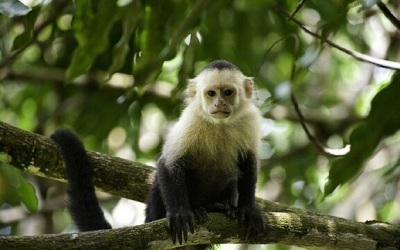10:All About Animals
8. Monkeys猴子
New Words新單詞
climb
讀音:[klaɪm]
釋義:爬,攀登
long
讀音:[lɒŋ]
釋義:長的
forest
讀音:[ˈfɒrɪst]
釋義:森林,叢林
fruit
讀音:[fru:t]
釋義:水果,果實
arm
讀音:[ɑ :m]
釋義:手臂
**********
Most of us find monkeys very interesting. This is because they look a little like us and can do some of the things we do. Some kinds of monkeys are very clever. When they are young, they learn how to use their eyes and their arms to ask their mothers for food. They can learn other things, too. When monkeys live near people, they can learn to understand some of the things people say.
我們大多數人都認為猴子很有趣。這是因為它們長得有點像我們,而且會做一些我們做的事。一些猴子非常聰明。它們小時候會學習怎麼用眼睛和手臂找它們的猴媽媽要食物。它們也能學習其他東西。當猴子靠近人類生活時,它們能學會理解人類說的一些事情。
There are many different kinds of monkeys. Most live in the forests of Asia, Africa and South America. Some monkeys are small. Others are very big. Adult monkeys can be one-and-a-half meters tall. In the forests, most monkeys live up in the trees. They are very good at climbing, and it is easy for them to climb from tree to tree.
猴子有很多不同種類。大多數猴子生活在亞洲、非洲還有南美洲的森林裡。有些猴子很小,有些猴子很大。成年猴子能有1.5米那麼高。在森林裡,大多數猴子生活在樹上。猴子非常擅長爬樹,對於猴子來說,從一棵樹爬到另一棵樹是很容易的。

Monkeys sometimes come to the ground to eat, but at night they climb back into the trees to sleep. If you look at the arms of a monkey, you will see that they are very long. Those long arms help the monkeys to climb trees. On the ground, monkeys can stand up and walk like people.
猴子有時候會下地覓食,但是晚上它們會爬回樹上睡覺。如果你看看猴子的手臂,你會發現它們的手臂非常長。那種長臂幫助猴子爬樹。在地面上,猴子們能夠像人一樣站立行走。
Usually, monkeys like to eat fruit. In most forests, it is easy for them to find all the fruit they need. Their long arms help them to do this, too. Their long arms make it easy to get the fruit from the tall trees.
通常猴子喜歡吃水果。在大多數森林裡,它們能輕易找到自己需要的水果。它們的長臂在這件事上也會幫到它們。它們的長臂使它們可以很容易從高高的樹上摘到水果。
Young monkeys drink their mothers’ milk. Later, when the monkeys are three to four years old, they can find their own food. They can look for their own food, but they still live with their families. The adult monkeys protect and look after the young ones. Most monkeys live to be forty or fifty years old.
年幼的猴子要喝猴媽媽的乳汁。之後當猴子們長到三四歲的時候,它們可以自己覓食。它們能夠自己覓食,但是它們仍然和猴子種群生活在一起。成年猴子保護並照顧年幼的猴子。大多數猴子可以活到四五十歲。
**********
Pat and her mother are talking about monkeys.
佩特和她媽媽正在談論猴子。

Pat
Mom, do you know what we studied at school today?
Mom
No, Pat. What did you study?
Pat
We studied monkeys. We learned all about them
Mom
Monkeys? Oh, I like monkeys. Some of them are just like people.
Pat
I know. Our teacher said that in zoos and other special places, monkeys can learn to understand what people say.
Mom
Yes. They can learn to understand what we say, but they can never learn to speak like us.
Pat
Our teacher said that, these days, there are not so many monkeys still living wild in the forests.
Mom
And did she tell you why?
Pat
Yes. She told us that because the world’s forests are getting smaller and smaller, there are not so many places for monkeys to live.
Mom
That’s right. These days, a lot of monkeys live in zoos. Maybe that’s better for the monkeys .
Pat
Why?
Mom
Because the people who work in the zoos can protect and look after the monkeys.
Pat
I don’t think it’s better. I think most monkeys want to live in the forests. I don’t think it’s right to keep monkeys in zoos.
Mom
M..mm.m, maybe you’re right. They should live in a big place where it’s easy for them to move around and climb lots of trees.
佩特
媽媽,您知道我們今天在學校裡學習了什麼嗎?
媽媽
不知道,佩特。你們學習了什麼?
佩特
我們學習了猴子。我們學習了所有關於它們的知識。
媽媽
猴子?噢,我喜歡猴子。有些猴子就像人一樣。
佩特
我知道,我們老師說在動物園裡還有其他特定地點,猴子能夠了解人們說的話。
媽媽
是的,它們能夠學會理解我們說的話,但它們學不會像我們一樣說話。
佩特
我們老師說,現在還住在森林裡的猴子不多了。
媽媽
那她告訴你們為什麼了嗎?
佩特
是的。她告訴我們因為世界上的森林面積正變得越來越小,沒有那麼多 地方給猴子生存了。
媽媽
沒錯。現在,許多猴子都生活在動物園裡。也許那樣對猴子來說更好。
佩特
為什麼?
媽媽
因為動物園裡的工作人員能夠保護並照顧這些猴子。
佩特
我認為這樣並沒有更好。我認為大多數猴子想要住在森林裡。我認為把 猴子們養在動物園裡是不對的。
媽媽
唔……也許你是對的。它們應該生活在寬敞的地方,可以很自如地四處活動和爬樹。
**********
Questions
1. Why do people find monkeys interesting?
2. How big can some adult monkeys be?
3. What are monkeys good at?
4. What do they eat?
5. How long do monkeys live?
6. Why are there not many monkeys in the wild now?
7. Where do you think monkeys should live?
**********